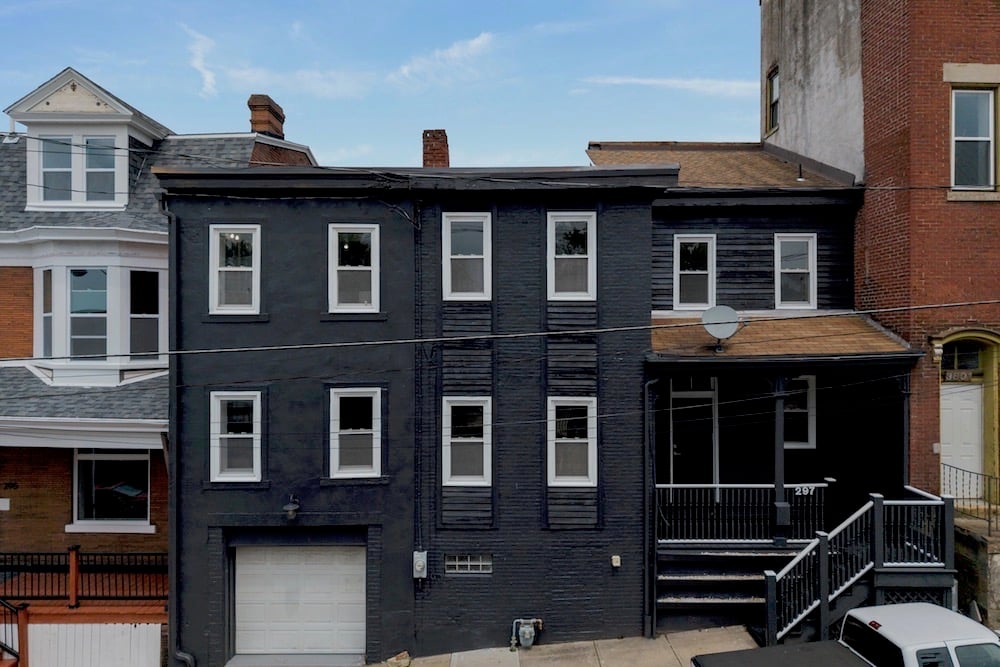House Hunting? This is What You Need to Know If You’re Buying a Flipped Home
Pittsburgh has some of the oldest housing stock in the country — and that mean a lot of renovated homes. Local experts say this is the information buyers should arm themselves with before hitting up those open houses.
The first sign of trouble for Mike, who asked to remain anonymous, at his new-to-him Troy Hill home began as a leak in his office. That leak quickly became a deluge that ruined the second-floor office and damaged the kitchen below.
Mike says that when he purchased the home in 2020, he was drawn in by the open floorplan of what appeared to be a nicely remodeled kitchen — which was suddenly in disrepair.
Once the ceiling began to leak, Mike says he contacted a roofer who quickly discovered that the issue was not the roof itself, but with ongoing box gutter issues that had been hidden behind a pretty flip job.
“This was my first home purchase, and I think in my excitement, I didn’t do a lot of due diligence,” Mike admits now.
Since that initial deluge, contractors at his home have found various shortcuts and hidden issues throughout every level of the home.
“All told, it’ll be around $30,000 to finish fixing the roof and repairing the structural problems that have built up over years and years of leaks,” says Mike.
While Mike’s story is heartbreaking, it’s not uncommon. Experienced local inspector Colin Fischetti of Guardian Home Inspection says there has always been varying quality in remodels; however, lower pandemic interest rates and pricing may have encouraged more novice flippers to saturate the business.
Inspection is Key
Fischetti notes the Pittsburgh region has many homes that were not occupied for a 25-year period after the decline of the steel industry during the 1970s. Those empty homes, typically in disrepair, are often the ones that attract flippers.
“We have a lot of properties that are getting near the end of their useful life,” Fischetti adds.
When buying a flipped home (or any home) Fischetti advises buyers on the importance of choosing a quality inspector — and of attending the inspection as well. While inspectors are not allowed to move furniture, open up walls or dig too deeply into a home, a well-trained inspector will be able to point out signs of a renovation that may be subpar.
Fischetti says one simple way to tell if investors used licensed plumbers, and had the updates inspected, is to peek under the sink. Is there an S-trap or a P-trap?
“We do not install S-traps anymore. Nothing should have an S-trap unless it’s a million years old. It’s not a correct install,” Fischetti says.
While it is not concerning if an older home that has not been updated has an S-trap — which is functional and safe in most cases — what it does signify is that the investors may not have followed all of the proper steps when remodeling.
Find the Right Realtor
Your agent should also be willing to attend your inspection with you, says Realtor Jeremy Thieroff, who notes he has only missed two inspections in his entire career. As an investor himself, Thieroff adds he has seen his share of bad flips, and he prides himself on not taking shortcuts during his own remodels.
For him, one sight that raises a red flag before he even walks in the door is sloppy or absent landscaping. He also checks the condition of the siding and the mortar. Some of these fixes are minor for a new owner, but they can indicate the renovator only focused on parts of the home with wow factor.
“When somebody’s doing a flip, what sells a house is the kitchens and bathrooms,” says Thieroff.
Additional signs of a problematic renovation include a basement that has been entirely painted, including the floor joists. This is often a tactic used to hide moisture, mold and even termite damage. A quick paint job can disguise a musty smell for a short period of time as well.
Mike says the owners of his bad flip pushed for a fast closing, which he now believes was an effort to hide the water damage they knew would become apparent with heavy rainfall.
“Whenever I walk into a flip where they went hog wild with paint, I’m immediately pulling out my screwdriver and poking into those floor joists because it’s very easy to miss termite damage if somebody’s gone wild with a paint sprayer,” adds Fischetti.
Know the Signs
For finished basements, it can be harder to tell if there’s an issue; in that case, Fischetti recommends examining the exterior downspouts, grading of the yard and any systems like French drains or sump pumps that can indicate if the basement’s water has been well mitigated. An experienced inspector will also check for bowed walls and foundation issues.
Buyers also shouldn’t let themselves be too impressed by flashy features like light fixtures and faucets. With a goal to put stars in homebuyers’ eyes, it’s easy to add low-budget wow factors from Amazon such as snazzy knobs that can distract from cheap cabinets, Thieroff says.
And while light fixtures you don’t care for are easy to change, structural issues or cheap finishes are harder to rectify. Instead, buyers should look at the quality of the flooring they chose. How clean are the paint lines? Where did they rush? A good inspector will note these red flags and discuss them with prospective buyers.
Conversely, some of the factors that novice house hunters think indicate a bad flip — such as a quick renovation timeline or a property that’s owned by an LLC — are not actually concerning, according to Thieroff and other home experts. It is possible for ethical and experienced contractors to renovate a vacant house at a quick pace, and creating an LLC is a common business practice for investors. To alleviate any concerns, make a checklist of any of the aforementioned details.
Protect Your Future
If you do end up drawn in by a bad flip, odds are there will not be much legal recourse. Sellers do not have to list anything on the disclosure sheet if they did not live in the property — and proving you were purposely misled by the sellers may be difficult to prove in court. Inspectors are also limited in what they can uncover, though a good inspector can help buyers see why a flip may have issues down the line.
Fischetti says buyers should always choose a home inspector certified by ASHI or InterNACHI; he also encourages Pittsburgh buyers to choose a locally owned company versus a national chain. Because Pennsylvania does not license home inspectors, it’s important for buyers to do their research, including reading Google reviews, which is often a good way to suss out issues with a particular contractor. If any further inspections, such as a sewer camera to check for blockages or tree roots, are needed, save the receipts.
Both Fischetti and Thieroff agree most buyers are willing to listen to their advice, but occasionally someone with stars in their eyes will proceed to purchase a home despite their warnings.
“The first thing that I remind your clients is don’t just fall in love with appearance,” says Thieroff. “It’s like going on a first date. They can look great on the surface, but once you get to know them, that’s going to affect how you feel about them, right?”
Meg St-Esprit is a Bellevue-based freelance journalist who covers real estate, lifestyle, education, parenting and travel for a variety of local outlets including Pittsburgh Magazine, PublicSource, Kidsburgh, Pittsburgh City Paper, and City Cast Pittsburgh. Meg offers Hot Property, an inside look into unique and historic homes on the market. Each week, Hot Property goes behind the For Sale sign to share the story of a special Pittsburgh-area home.
















